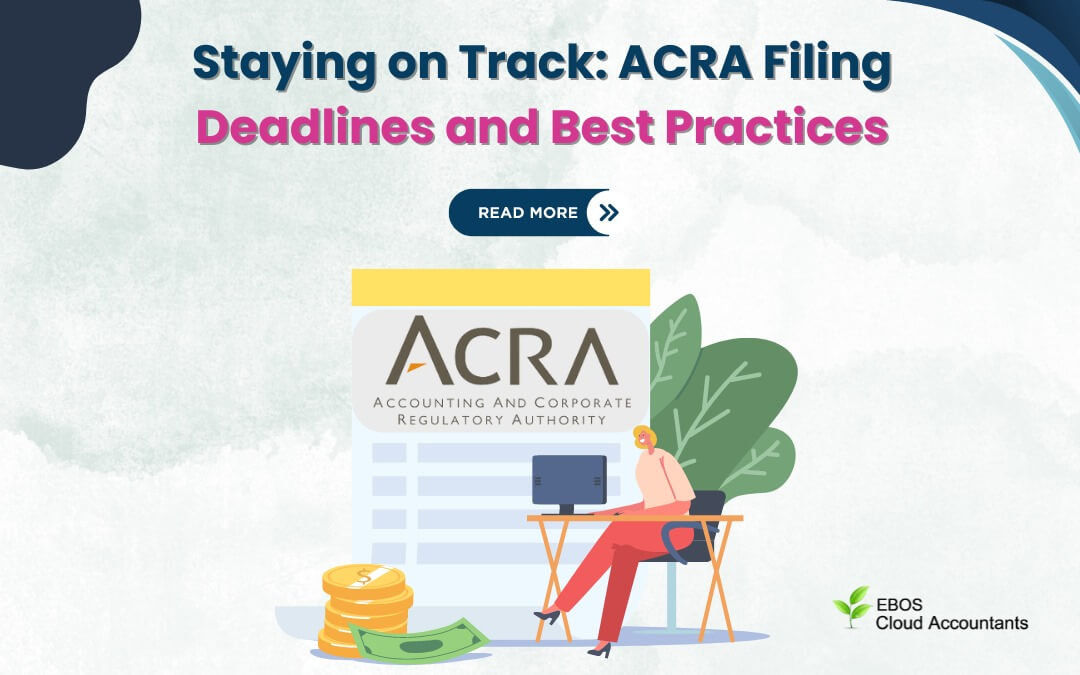Filing with the Accounting and Corporate Regulatory Authority (ACRA) in Singapore is essential; all registered firms in Singapore must fulfill this legal obligation. Failure to comply with filing requirements may lead to penalties, fines, or legal action.
Moreover, companies that regularly and timely file with ACRA benefit from a positive relationship with the authorities. This is critical for maintaining the company’s reputation and credibility within the business community.
In this article, we will walk you through ACRA filing deadlines and best practices.
ACRA Filing Deadlines:
Annual Return (AR)
-Private Limited Companies: Companies must submit the Annual Return within seven months of the end of the fiscal year.
-Public Limited Companies: Companies must submit the Annual Return within 5 months of the end of the fiscal year.
Financial Statements
-Private Limited Companies: Companies must produce financial accounts within 6 months of the end of the fiscal year.
-Public limited companies must file their financial statements no later than four months following the end of the fiscal year.
Tax Filing
Filing for Estimated Chargeable Income (ECI)
-Companies must file ECI within three months of the end of their fiscal year. Filing for Corporate Income Tax (Form C/C-S) Companies must file their corporate income tax returns using either Form C or Form C-S, with deadlines normally set for November 30th of the year after the conclusion of the company’s fiscal year.
-Companies that qualify for Form C-S (simplified tax filing) must normally file by December 15th of the year following the end of the fiscal year.
Annual General Meeting (AGM)
-Private Limited Companies: Companies must hold the AGM within six months of the end of the company’s fiscal year and Public Limited Companies: Companies must convene the AGM within four months of the conclusion of the fiscal year.
Companies should comply with AGM timelines to avoid penalties and retain good standing with Singapore’s Accounting and Corporate Regulatory Authority (ACRA).
ACRA Filing Best Practices
Implementing best practices for ACRA filing assures regulatory compliance and helps your business run smoothly.
Stay Organized: Keep track of all financial transactions, company paperwork, and compliance-related details. Understand Filing Requirements: Be aware of your organization’s unique filing requirements, such as deadlines, forms, and supporting documents required for submission. Use Technology: Streamline record-keeping and make filings easier to prepare and submit by using accounting software or corporate compliance management solutions. Plan Ahead: Schedule filing duties ahead of deadlines to minimize last-minute rushing and ensure timely submission.
In Summary
ACRA filing is critical for legal compliance, transparency, keeping good standing, obtaining financing, complying with taxes, and avoiding penalties.
Moreover, ACRA filings are frequently tied to tax compliance. Timely production of financial statements and other documentation assures compliance with tax legislation, including corporate income tax filing requirements. If you want to seek professional assistance, consider contacting EBOS Cloud Accountants If you’re concerned about the filing process or require expert direction, consider hiring professional help with preparation and submission.







